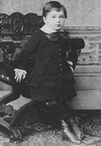
When Rabbi Nahum of Ruzhin, a Kabbalist of the last century, found his students playing checkers, he told them of the similarity between the rules of the game at hand and the rules of spirituality: first of all, you cannot make two moves simultaneously; secondly, you can move forward but not backward; thirdly, one who reaches the end can move as one likes, according to one’s desires.
If we believe that someone is talking about us, we become interested in what they are saying. That which is desired but is concealed is known as a “secret.” If we read the Bible and feel that it is talking about us, then we are considered to have begun studying the hidden wisdom of Kabbalah, where we will read about ourselves, although we are not yet aware of this.
As we progress on the spiritual path, we will realize that the Bible speaks about us, and then the Bible will transform from being concealed to being revealed. Those who read the Bible without posing questions about themselves cannot discern in the Bible either the hidden or the revealed parts; to those individuals, the Bible appears simply as a historical account or a collection of legal statutes.
pp. 270-1 of the book Attaining the Worlds Beyond by Rav Michael Laitman, PhD
– Free Download (PDF)
– Purchase
– Audio Version
Click Here to Sign Up for a Free Kabbalah Introductory Course – Starts Soon!





